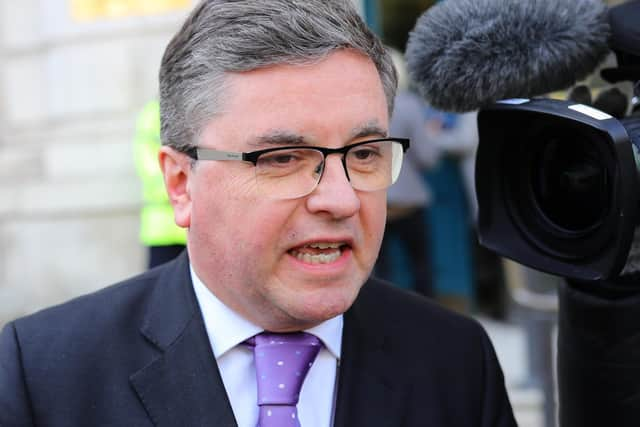Justice Secretary says case of York woman wrongly prosecuted under coronavirus laws was 'deeply unfortunate'
Appearing remotely before Parliament’s Joint Committee on Human Rights today, Robert Buckland was asked whether the prosecution of Marie Dinou, from York, concerned him.
Ms Dinou, 41, was arrested at Newcastle Central Station on March 28 after she allegedly failed to tell officers why she needed to travel.
Advertisement
Hide AdAdvertisement
Hide AdShe was arrested on suspicion of breaking restrictions imposed under the Coronavirus Act 2020 and subsequently fined £660 at North Tyneside Magistrates’ Court.


But the BTP said that, following a joint review with the Crown Prosecution Service (CPS), it had established that she was charged under the incorrect section of the Coronavirus Act.
The BTP agreed to contact the court and ask for the case to be relisted and the conviction set aside.
A number of other people have been wrongly convicted under the new laws, including a 21-year-old man who was wrongly convicted and fined, and a 15-year-old boy.
Advertisement
Hide AdAdvertisement
Hide AdWestminster North MP Karen Buck told Mr Buckland Ms Dinou’s case was a “really good example” of police confusion between the law and guidance issued by the Government.
Earlier in the month MPs were told police had initially been following “policy intent” rather than the law.
Ms Buck said she was “hugely supportive” of the work of the police, she said: “They are frontline public servants, like so many others, and putting themselves frequently in harm's way to do that. And there's a very high level of public appreciation for that job and for ensuring that the lockdown is enforced effectively.”
But she said: “We are using the criminal law here and the consequences of that are profound. If somebody is prosecuted and found guilty under this legislation, they will have a criminal record and the consequences of that can be life-changing, so it's incredibly important that we're not picking up the pieces later on, but to try and pre-empt problems, and make sure that we get it right as early as possible.”
Advertisement
Hide AdAdvertisement
Hide AdShe said there had been “confusion between the law and guidance in particular” and added that “a really good example of this was the case of Marie Dinou, who was prosecuted and fined under the coronavirus legislation, but for an offence that didn't actually exist in law”.
She said: “So I just wanted to ask you, if you were concerned about that, and what that told you, and what the Government's response should be to a case that seems to illustrate so well that level of confusion?”
Mr Buckland was reticent to reference the case directly but said it was “a deeply unfortunate case for the lady concerned” and that the circumstances were “regrettable”.
He said: “What I will say is that whenever we get examples of, frankly, a failure by prosecutorial authority, the investigating authority, to apply the law in principle properly, then thank goodness we have a robust and independent judiciary in a court system that deals with it that makes the necessary rulings, that does so without any question or influence of Government or politicians, and eloquently epitomises the rule of law.”
Advertisement
Hide AdAdvertisement
Hide AdEarlier this month MPs were told police officers initially tried to enforce coronavirus lockdown rules based on “stark” messages from politicians rather than new legislation.
Simon Kempton, from the Police Federation, told the Home Affairs Select Committee that normally officers would be trained before new legislation came into force.
But lockdown powers under the Health Protection (Coronavirus) Regulations and the Coronavirus Act were brought in so quickly that this was not possible.
He said: “We had a period of time, several days, where actually our only briefing was the very clear, very stark guidance that ministers and other Government officials were giving to the public.
Advertisement
Hide AdAdvertisement
Hide Ad“We didn’t at that time have anything in writing, and that might have led to some of the inconsistencies in approach.”
Paul Griffiths, from the Police Superintendents Association, said that initially officers were guided by “policy intent” rather than the new law.
He told the committee that the legislation “has been introduced at a pace and at a scale that we have never experienced before”.
Mr Griffiths added: “Very early on there was probably some confusion. There was a real need for a clear and consistent message both from the government, from the police and other agencies about what this meant.
“I think a lot of officers relied on the policy intent before the law was enacted.”